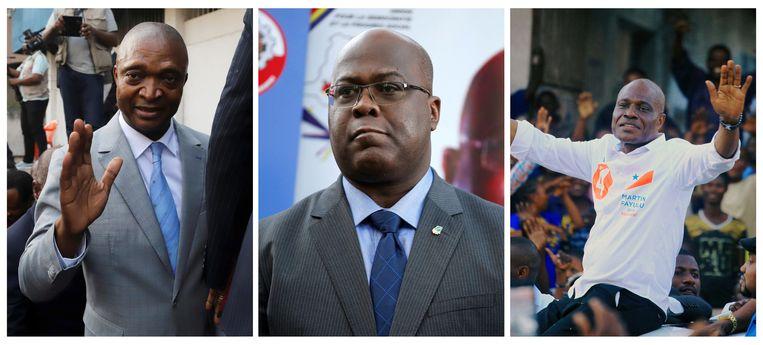More than 20 politicians have signed up as candidates to succeed Congolese President Joseph Kabila, but only three candidates campaign throughout the more than 2 million km² country. These are Emmanuel Ramazani Shadary, candidate for the Kabila camp, Felix Tshisekedi and Martin Fayulu.
The opposition aspired to come forward with one candidate in recent months. Fayulu was appointed as the opposition candidate in Geneva in November, but 24 hours later, Tshisekedi and Vital Kamerhe withdrew their support, under pressure from their base. A few days later the latter two joined together: Tshisekedi as candidate for president, Kamerhe as candidate for prime minister.
Emmanuel RAMAZANI SHADARY
The 58-year-old Ramazani was appointed in August to the presidential candidate of the Front Common for the Congo (FCC), the alliance of current President Joseph Kabila. It was not until several hours before the deadline that this news seeped from the FCC conclave in Kingakati. That Ramazani was appointed as a candidate came as a surprise to many observers, but it is now clear why he was chosen. He is one of Kabila’s most loyal supporters, has no political support and does not have his own financial resources, which makes it easier for Kabila to control him for the next five years. Making EU sanctions against Ramazani also helps to keep him in step.
By choosing someone like Ramazani, Kabila wanted to avoid the Angola scenario. The Angolan president José Eduardo dos Santos stepped up in September 2017 after 38 years in power, and his defence minister designated João Lourenço as his successor. Soon, however, it started a campaign against corruption, and also seized the president and his entourage.
The EU sanctions were there, because of the bloody repression of street protests against Kabila, when Ramazani was Minister of the Interior. He held this post from November 2016 to February 2018. Before that, he was party leader for the PPRD, the party of the president he founded in 2002.
“Ramazani will not rule, more than Kabila,” said government spokesman Lambert Mende. “He will be the man who continues the work of Kabila.”
He is married and has eight children.
Martin FAYULU
Until a few weeks ago, Fayulu (62) was an outsider, until he was appointed as their candidate in mid-November in Geneva by various opposition headings. There the heavyweights Moïse Katumbi, until 2015 the governor of the mining province Katanga, and Jean-Pierre Bemba, acquitted earlier this year by the ICC in The Hague, expressed their support. Katumbi and Bemba were also candidates, but were excluded from participation.
Fayulu has been active in the Congolese opposition for many years, but his ECiDé (Engagement pour la Citoyenneté et le Développement) (COMMITMENT TO CITIZENSHIP AND DEVELOPMENT (Ecide)) is small. Until he got the support of Katumbi and Bemba he seemed condemned to a role in the background. Thanks to the support of these two heavyweights, Fayulu succeeds in fighting over his weight: he has, for example, two private planes, the means to campaign throughout the country.
During the anti-Kabilia efforts of recent years, Fayulu showed up a few times. Unlike other opposition headings, he did participate in those demonstrations. In this way he was wounded at a demonstration, and he was also arrested once, which earned him the nickname “soldat du people” (soldier of the people).
Fayulu has worked in the past in various countries for oil companies, but is also active as a businessman in his own country. He operates a well-known hotel in Kinshasa, among other places. He studied in France and the United States.
In the margins of one of his campaign meetings, it came to heavy violence. According to the Fayulu camp, at least four people were killed in Lubumbashi, but the regime denies that.
Like Tshisekedi, Fayulu does not believe that the elections will be fair and free.
Felix TSHISEKEDI
Like his father Etienne in 2011, son Felix Tshisekedi (55) also aspires to presidency. He has previously committed himself to Vital Kamerhe. The two politicians initially supported the appointment of Fayulu as a candidate for the Congolese opposition, but with the support of their supporters they withdrew a day later.
For these elections, Tshisekedi can build on the machine of his UDPS, the largest opposition party, although Kabila succeeded in dividing it in recent years. Moreover, Tshisekedi does not have the status that his father had acquired over the years.
Etienne Tshisekedi was for years the eminence grise of the Congolese opposition, but died in early 2017 in Brussels. He took on Kabila in 2011, but had to survive in a ballot that went fraudulently according to observers.
In 2011, Felix was elected to parliament, but his father had banned all UDPS candidates from taking their seats in protest against the fraudulent election process. Felix followed that slogan, but in recent years it has been together several times with the regime for (secret) negotiations.
Tshisekedi is father of five children. His opponents often question his credibility: they ask questions about his diplomas and blame him for never having taken up a leading position.
If he is elected, one of his priorities becomes the burial of his father. His body is still lying in a Brussels crematorium, because no agreement is found about the funeral.
